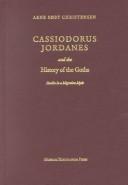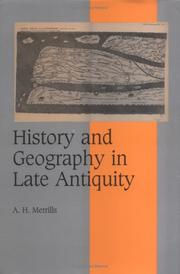| Listing 1 - 2 of 2 |
Sort by
|

ISBN: 8772897104 9788772897103 Year: 2002 Publisher: Copenhague: Museum Tusculanum Press,
Abstract | Keywords | Export | Availability | Bookmark
 Loading...
Loading...Choose an application
- Reference Manager
- EndNote
- RefWorks (Direct export to RefWorks)
Goten --- Goths --- Germanic peoples. --- Goths. --- Civilization, Medieval. --- Civilization, Medieval --- Germanic peoples --- Ethnology --- Germanic tribes --- Indo-Europeans --- Teutonic race --- Medieval civilization --- Middle Ages --- Civilization --- Chivalry --- Renaissance --- History --- Jordanes, --- Cassiodorus, --- Cassiodor, --- Cassiodorius, Flavius Magnus Aurelius, --- Cassiodoro, Flavio Magno Aurelio, --- Cassiodoro, --- Cassiodorus, Flavius Magnus Aurelius, --- Cassiodorus, M. Aurelius, --- Cassiodorus, Magnus Aurelius, --- Cassiodorus Senator, Flavius Magnus Aurelius, --- Kasjodor, --- Kassiodor, --- Cassiodore, --- Iordanes, --- Jornandès, --- Europe --- Council of Europe countries --- Eastern Hemisphere --- Eurasia --- Historiography.. --- Jordanes --- Cassiodorus --- Aurelius Cassiodorus, Magnus --- Cassiodorus, Flavius Magnus Aurelius --- Cassiodorus, Senator --- Cassiodore --- Cassiodor --- Cassiodoro --- Iordan, --- Иордан, --- Cassiodorius, Flavius Magnus Aurelius --- Cassiodoro, Flavio Magno Aurelio --- Cassiodorus, M. Aurelius --- Cassiodorus, Magnus Aurelius --- Cassiodorus Senator Flavius Magnus Aurelius --- Kasjodor --- Kassiodor --- Cassiodore (flavius magnus aurelius cassiodorus), 480-575 --- Histoire

ISBN: 9780521846011 0521846013 9780511496370 9780521075985 0511127995 9780511127991 0511127685 9780511127687 0511496370 9780511127465 0511127464 9786610217991 6610217998 1280217995 9781280217999 0511200153 9780511200151 0511309112 9780511309113 052107598X Year: 2005 Volume: 64 Publisher: Cambridge: Cambridge university press,
Abstract | Keywords | Export | Availability | Bookmark
 Loading...
Loading...Choose an application
- Reference Manager
- EndNote
- RefWorks (Direct export to RefWorks)
The period from the fifth century to the eighth century witnessed massive political, social and religious change in Europe. Geographical and historical thought, long rooted to Roman ideologies, had to adopt the new perspectives of late antiquity. In the light of expanding Christianity and the evolution of successor kingdoms in the West, new historical discourses emerged which were seminal in the development of medieval historiography. Taking their lead from Orosius in the early fifth century, Latin historians turned increasingly to geographical description, as well as historical narrative, to examine the world around them. This book explores the interdependence of geographical and historical modes of expression in four of the most important writers of the period: Orosius, Jordanes, Isidore of Seville and the Venerable Bede. It offers important readings of each by arguing that the long geographical passages with which they were introduced were central to their authors' historical assumptions and arguments.
Middle Ages --- Historical geography. --- Historiography. --- Orosius, Paulus. --- Jordanes, --- Bede, --- Isidore, --- Europe --- History --- 912:930 --- 930.12 "04/14" --- Cartografie. Kaarten. Plattegronden. Atlassen-:-Geschiedwetenschap. Hulpwetenschappen der geschiedenis --- Theorie van de historische kennis:--Middeleeuwen --- 930.12 "04/14" Theorie van de historische kennis:--Middeleeuwen --- Historical geography --- Medievalists --- Geography, Historical --- Geography --- Historiography --- Orose --- Iordanes, --- Jornandès, --- Isidoro, --- Isidor, --- Isidorus, --- Seville, Isidore of, --- Sevilla, Isidoro de --- De Sevilla, Isidoro, --- Sevilla, Isidor von, --- Von Sevilla, Isidor, --- Izydor, --- Baeda Venerabilis, --- Beda, --- Beda Venerabilis, --- Bedanus, --- Venerable Bede, --- Rome --- Iordan, --- Иордан, --- Isidorus Hispalensis --- Isidore --- Arts and Humanities --- Middle Ages - Historiography. --- Jordanes, - active 6th century --- Bede, - the Venerable, Saint, - 673-735. --- Isidore, - of Seville, Saint, - d. 636. --- Europe - Historiography. --- Europe - History - To 476. --- Europe - History - 392-814. --- Orisio, Paulo --- Orosio --- Ūrūsyūs --- Orósio, Paulo --- Orosius, --- Oroziĭ, Pavel --- اوروسيوس --- هروشيوش، پاولوس
| Listing 1 - 2 of 2 |
Sort by
|

 Search
Search Feedback
Feedback About UniCat
About UniCat  Help
Help News
News